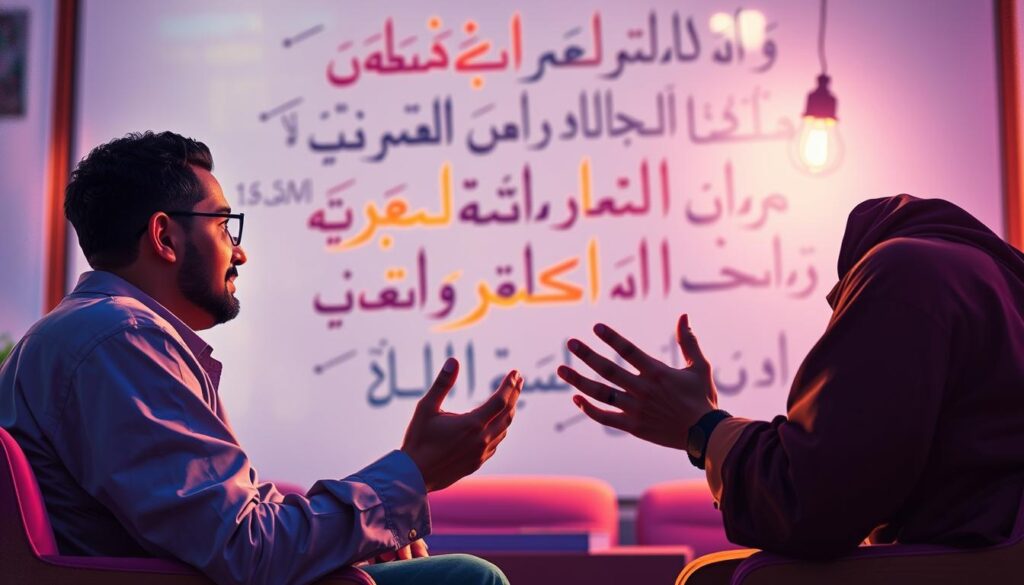Arabic is one of the most spoken languages worldwide, with over 300 million native speakers. Learning to speak Arabic can be very useful. To speak Arabic confidently, you need to practice, immerse yourself in the culture, and dedicate yourself to learning.
Introduction to Arabic Conversation
Learning Arabic means understanding its many dialects. There are about 30 different Arabic dialects, each unique to a region. By mastering unique sounds, thinking in Arabic, and learning common phrases, you can improve your Arabic speaking skills.
Table of Contents
Understanding Arabic Dialects
Starting your arabic conversation practice means learning about the many dialects in the Arab world. There are over 20 dialects, each with its own special traits. It’s important to know which one to learn first.
It’s best to start with Modern Standard Arabic (MSA) or the dialect of your favorite region. MSA is the base for all dialects and is understood everywhere. Learning a specific dialect helps you talk better with native speakers.
Some popular dialects include Egyptian, Levantine, and Gulf Arabic. Egyptian Arabic is widely understood and often used when people from different places talk. Levantine Arabic, from Lebanon and Syria, is known for its beautiful sound and moderate speed. Gulf Arabic, from Saudi Arabia and the UAE, is slower and more formal.
Knowing about different dialects helps you get better at arabic conversation practice. Whether you choose MSA or a specific dialect, keep practicing and dive into the language.
Essential Phrases for Daily Conversations
To get better at speaking Arabic, you need to learn key phrases for everyday talks. These phrases will boost your confidence in talking Arabic. Start with common greetings like “مرحبًا” (hello) and “السلام عليكم” (peace be upon you).
It’s also important to learn phrases for daily situations. Sayings like “كيف حالك؟” (how are you?) and “هل يمكنني رؤية قائمة الطعام؟” (may I see the menu?) are useful. Knowing these can make you 80% more effective in Arabic-speaking places.
Here are some more phrases to learn:
- “أين…؟” (where is…?) for asking directions
- “كم يكلف هذا؟” (how much does this cost?) for price talks
- “هل تتكلم الإنجليزية؟” (do you speak English?) for talking to locals
- “النجدة!” (help!) for emergencies
Learning these phrases will help you improve your Arabic speaking skills. Practice often and dive into the language to keep your skills sharp.
Building Your Vocabulary Effectively
To get better at Arabic conversation, focus on growing your vocabulary. Spend a few minutes each day learning new words. Talking online in arabic conversation keeps you motivated and shows your progress. Just 15 minutes a day can really boost your skills.
Flashcards are a great tool for learning new words. You can make them by hand or use apps that help you remember. Also, taking arabic conversation lessons with a teacher can give you feedback and help you improve.
Here are some benefits of building your vocabulary:
- Enhanced communication skills in writing, conversing, and public speaking
- Improved understanding of words and their nuances
- Increased confidence in arabic conversation online and in-person interactions
Make vocabulary building a part of your daily routine. Stay consistent and try different methods, like apps or word games. With hard work and practice, you’ll get good at Arabic and have better conversations online and in person.
The Role of Cultural Context in Conversations
When you practice arabic conversation, it’s key to think about the cultural background. This ensures you communicate with respect. Knowing the cultural subtleties helps you talk about different topics in Arabic.
In Arabic culture, being polite and respectful is very important. Saying “شكراً” (Shukran) for “Thank you” and “من فضلك” (Min faḍlik) for “Please” helps a lot in making friends.
In Saudi Arabia, how you talk changes based on the situation. In work, people speak straight to the point. But, when talking to older people, it’s better to be indirect. Also, be careful with criticism to avoid hurting someone’s feelings.
Some important things to remember about Saudi culture in conversations are:
- Friends of the same gender often hug, but opposite genders usually don’t.
- Looking directly at someone is okay with friends, but not between men and women to show respect.
- Hand gestures are very important. They show if you agree, disagree, are patient, or sincere.
By understanding these cultural details and using them in your arabic conversation practice, you can make better connections. You’ll also talk more effectively about various topics.
Listening Skills: The Key to Improvement
To get better at speaking Arabic, listening is key. Many find listening hard, showing a big challenge. But, listening to real Arabic can really help you understand and learn new words.
Listening a lot can make you speak more naturally and avoid mistakes. Watching Arabic news and podcasts can make you more interested and better at understanding. Start by listening to Egyptian Arabic podcasts online.
Here are some tips to get better at listening:
- Make a listening plan, like 15 minutes every day or an hour a week
- Watch movies or TV shows with Arabic subtitles
- Get involved with what you’re listening to, like taking notes or summarizing
It’s important to listen to different accents and speaking styles. This helps you not get stuck on one way of speaking. Talking with native speakers or joining groups can also boost your skills. With these tips and regular practice, you can really improve your listening and speaking abilities.
Practicing Arabic with Native Speakers
As you learn Arabic, talking with native speakers is key to get better. Arabic conversation lessons are very helpful here. You can learn arabic conversation phrases in real situations and get tips on how to speak and write.
To find someone to practice with, try online sites or local language events. This way, you can talk in real-life situations. For example, apps like HelloTalk or Tandem can connect you with Arabic speakers for practice.

- Improved pronunciation and grammar
- Increased fluency and confidence
- Enhanced understanding of cultural nuances and context
Using arabic conversation phrases every day can make you a better Arabic speaker. It boosts your speaking skills.
Remember, regular practice is important to get good at speaking Arabic. Try to practice every day, even if it’s just for a few minutes. Use arabic conversation lessons to keep improving.
Overcoming Conversation Anxiety
Learning to speak Arabic can sometimes make you feel nervous. This is normal, and it’s key to deal with it to speak confidently. Start by practicing a lot. Talk to native speakers and try to use Arabic as much as you can.
Start small to build your confidence. Begin with short talks and slowly make them longer. Try relaxation methods like deep breathing or meditation to calm down before you speak. Remember, facing your fears is the best way to beat anxiety.
- Focus on the conversation, not your anxiety
- Practice active listening to improve your comprehension
- Use positive self-talk to boost your confidence
By following these tips and practicing often, you’ll get better at speaking Arabic. Don’t worry about mistakes – they help you learn. With time and effort, you’ll talk Arabic with ease and confidence.
Utilizing Technology for Language Learning
As you learn Arabic, using technology is key to bettering your skills. Digital tools and platforms offer many resources for arabic conversation topics. A study on language learning platforms shows how tech makes learning easier and more flexible.
Top tools for arabic conversation practice include apps, online courses, and virtual classrooms. These offer tailored lessons, interactive exercises, and feedback. You can also listen and speak with native speakers through YouTube, podcasts, and forums.
- Language learning apps like Busuu and Arabits
- Online courses and tutorials on platforms like Udemy and Coursera
- YouTube channels like Learn Arabic with Maha and ArabicPod101
- Podcasts like ArabicPod and BBC Arabic
Using these tech tools can make learning Arabic better. Practice often and enjoy the ease and reach of technology.
The Importance of Pronunciation
When you want to improve arabic conversation skills, pronunciation is key. Arabic has sounds and rules that are hard for non-native speakers to get right. To speak well, you must focus on how you say words. Online tools for arabic conversation help you practice and get better.
Common mistakes include wrong guttural sounds and mixing up consonants. Also, getting the length of vowels wrong is common. To fix these, practice often. Use IPA charts, apps, and online courses. Watching Arabic movies and listening to music also helps.
Here are some tips to better your Arabic pronunciation:
- Practice regularly, setting aside dedicated time for exercises
- Use language apps, such as Duolingo, Rosetta Stone, and Memrise, which provide structured pronunciation exercises and feedback
- Engage with native speakers through platforms like iTalki or Preply, which can provide personalized feedback

Setting Realistic Language Goals
Learning Arabic requires setting realistic goals for success. With arabic conversation lessons, you can boost your speaking skills and confidence. It’s key to define your goals and track your progress.
Set specific, measurable, and achievable targets. For example, aim to master certain arabic conversation phrases or reach a specific level of proficiency. This helps you stay on track and motivated.
Break down big goals into smaller tasks. Practice for a set time each day or learn a certain number of new words. This way, you make steady progress and see your skills improve.
Success comes from setting realistic goals and tracking your progress. With hard work and persistence, you can become proficient in Arabic. Using arabic conversation phrases daily will enhance your speaking skills and confidence.
Joining Arabic Language Communities
As you learn arabic conversation, it’s key to be around people who love the language too. Joining arabic language communities lets you practice speaking, get feedback on your accent, and learn from others. This way, you can grow your skills together.
Online, you can find many groups for learning arabic, like Reddit’s r/learn_arabic with over 90,000 members. HelloTalk connects over 20 million users worldwide for language exchange. Facebook also has thousands of groups for arabic language learners, with some having more than 50,000 members.
Some top arabic language learning communities include:
- Reddit’s r/learn_arabic subreddit
- HelloTalk language exchange platform
- Facebook groups dedicated to arabic language learning
- Meetup groups for in-person arabic language meetups
Being part of these communities helps you improve your arabic conversation skills. You’ll get support, motivation, and stay on track with your learning. Always practice and dive deep into the language to become fluent in arabic conversation.
Celebrating Your Progress in Learning Arabic
As you’ve made progress in learning Arabic, take time to think about your achievements. You might have learned new words, become more confident in , or handled smoothly. Each achievement shows your dedication and effort.
Now, set new goals to keep growing. Maybe you want to read Arabic books or talk more with native speakers. Setting goals helps you stay motivated and improve your Arabic skills. Remember, becoming fluent is a journey, so enjoy every chance to learn and get better.
Learning a language is a lifelong journey, and patience is key. Celebrate every success, no matter how small. Don’t get discouraged by challenges. With determination and a positive attitude, you’ll keep improving your Arabic skills.
Source Links
- Effective Strategies for Improving Arabic Speaking – https://www.explorearabic.org/effective-strategies-for-improving-arabic-speaking/
- How to Have a Successful Arabic Conversation Course – https://resala-academy.com/arabic-conversation-course/
- If I Started Learning Arabic Again, This Is How I’d Do It – https://www.mezzoguild.com/how-to-start-learning-arabic/
- Arabic dialects | Understanding the types of Arabic – https://preply.com/en/blog/arabic-dialects/
- Arabic Dialects With Types & Differences To Choose The Right Dialect To Learn – KALIMAH – https://kalimah-center.com/arabic-dialects/
- Master Small Talk in Arabic: 10 Key Phrases for Everyday Conversations | Alifbee Blog – https://blog.alifbee.com/small-talk-in-arabic-for-everyday-conversations/
- The most important Arabic sentences used in everyday life – https://nashraharabic.com/the-most-important-arabic-sentences-used-in-everyday-life/
- Effective Ways to Build Your Vocabulary – Johnson O’Connor Research Foundation – https://www.jocrf.org/resources/effective-ways-build-your-vocabulary/
- 10 Ways to Build a Strong Vocabulary – Oxford Learning – https://www.oxfordlearning.com/10-ways-to-build-a-strong-vocabulary/
- 12 Ways to Build Your Vocabulary in English – OHLA Blog – https://www.ohla.com/blog/12-ways-to-build-your-vocabulary-in-english/
- Basic Arabic Conversation For Beginners – KALIMAH – https://kalimah-center.com/basic-arabic-conversation-for-beginners/
- Saudi Arabian – Communication – https://culturalatlas.sbs.com.au/saudi-arabian-culture/saudi-arabian-culture-communication
- Listening in Arabic | Strong Guide of 7 Steps with Tips – https://arabictutoronline.com/listening-in-arabic/
- PDF – https://files.eric.ed.gov/fulltext/EJ1446764.pdf
- Boost Your Arabic Listening Skills: Effective Tips – https://nashraharabic.com/tips-to-improve-arabic-listening-skills/
- Learn Arabic with native speaking tutors – https://preply.com/en/online/arabic-native-speakers
- Practice Arabic Speaking And Learn Arabic Conversation Online – https://kalimah-center.com/practice-arabic-speaking/
- How to Overcome Social Anxiety? | About Islam – https://aboutislam.net/counseling/ask-the-counselor/mental-health/overcome-social-anxiety/
- How to overcome social anxiety and feel confident in front of anyone – https://www.linkedin.com/pulse/how-overcome-social-anxiety-feel-confident-front-anyone-helen-packham-vyeme
- Council Post: Digital Tools Transforming Arabic Language Learning – https://www.forbes.com/councils/forbestechcouncil/2024/07/08/digital-tools-transforming-arabic-language-learning/
- Artificial Intelligence in Arabic Linguistic Landscape: Opportunities, Challenges, and Future Directions – https://www.temjournal.com/content/134/TEMJournalNovember2024_3137_3145.pdf
- Artificial Intelligence (AI) for Language Learning – Center for Languages and Cultures – https://dornsife.usc.edu/center-for-languages-and-cultures/artificial-intelligence-ai-for-language-learning/
- Arabic Pronunciation Tips for Non-Native Speakers – Arabic Blog – https://earabiclearning.com/blog/2024/09/arabic-pronunciation-tips-for-non-native-speakers-2/
- Innovative Techniques to Improve Arabic Pronunciation – https://nashraharabic.com/innovative-techniques-to-improve-arabic-pronunciation/
- Master Arabic Pronunciation: Avoiding Common Errors – https://nashraharabic.com/mastering-arabic-pronunciation-avoiding-common-errors/
- The Goldilocks Technique: How to Set Language Goals that Are Just Right – https://www.fluentin3months.com/goldilocks/
- How to Set Realistic Language Learning Goals | FluentU Language Learning – https://www.fluentu.com/blog/learn/language-learning-goals/
- Setting Realistic Language Learning Goals: A Step-by-Step Guide – Talkpal – https://talkpal.ai/setting-realistic-language-learning-goals-a-step-by-step-guide/
- Best Arabic Language Learning Communities – Talkpal – https://talkpal.ai/best-arabic-language-learning-communities/
- Effective Strategies for Learning Arabic for Non-Natives – https://nashraharabic.com/strategies-for-non-native-speakers-to-learn-arabic/
- Here to Learn Arabic in America: Your Complete Guide with IQRA Network – https://iqranetwork.com/blog/here-to-learn-arabic-in-america-your-complete-guide-with-iqra-network/
- How to Build a Strong Arabic Vocabulary: 5 Tips and Resources | Alifbee Blog – https://blog.alifbee.com/how-to-build-a-strong-arabic-vocabulary/
- How long does it take to learn Arabic? – https://nashraharabic.com/how-long-does-it-take-to-learn-arabic/
- How to Learn Arabic Language Online the Effective Way? – https://alustadh.com/how-to-learn-arabic-language-online/

